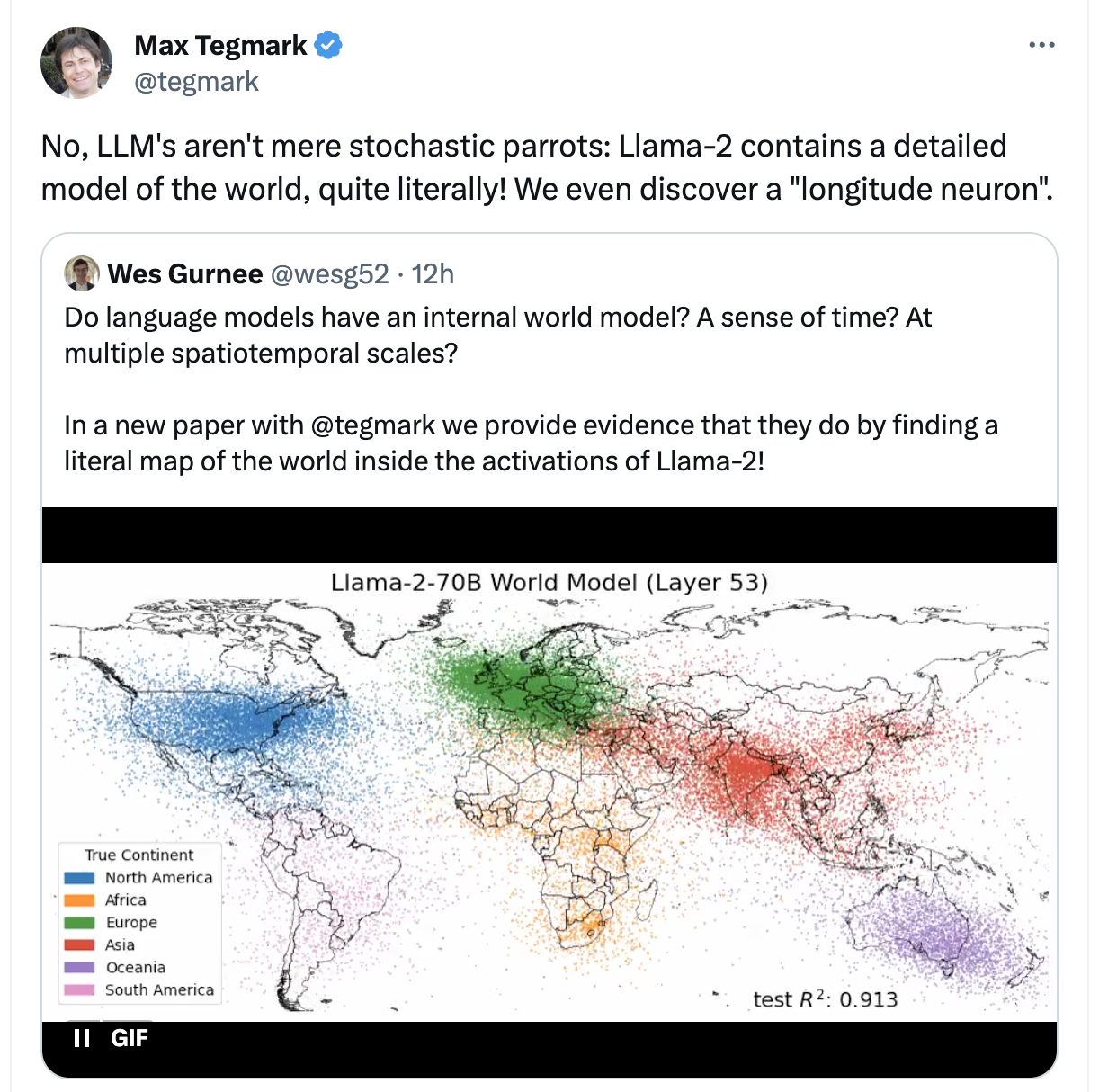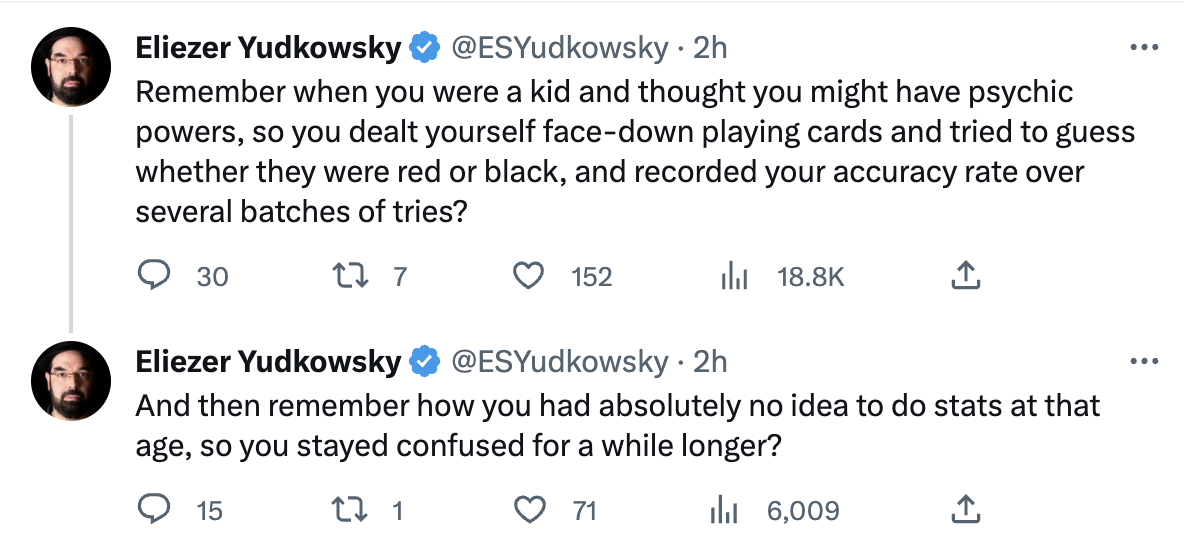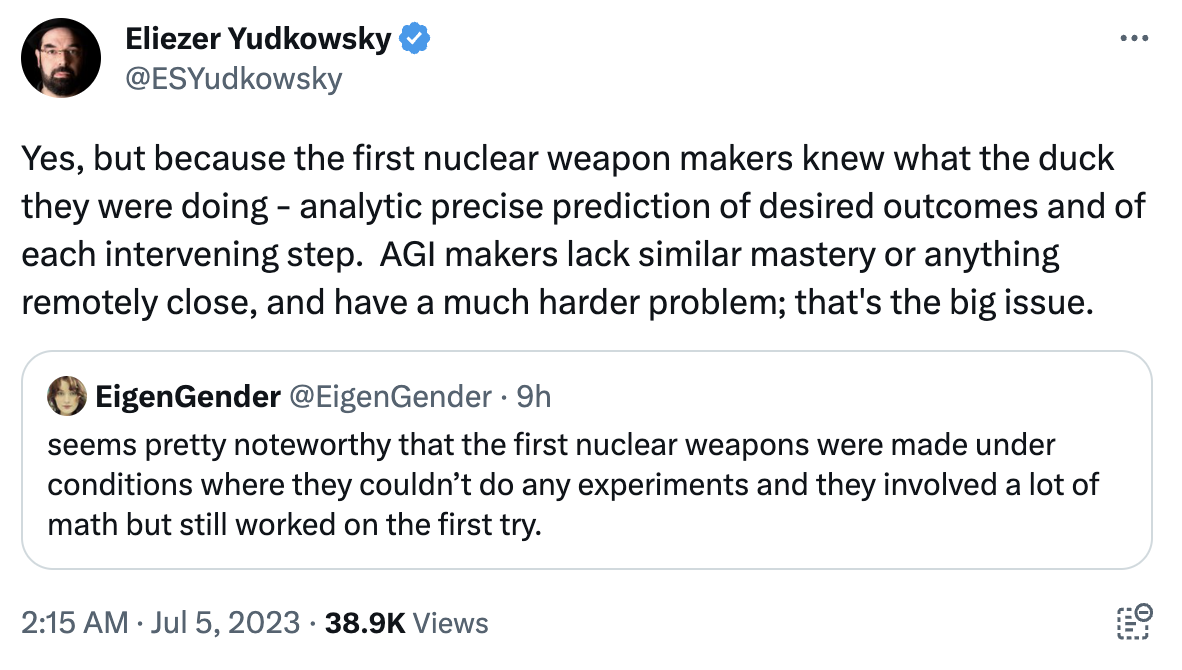Nitter link
With interspaced sneerious rephrasing:
In the close vicinity of sorta-maybe-human-level general-ish AI, there may not be any sharp border between levels of increasing generality, or any objectively correct place to call it AGI. Any process is continuous if you zoom in close enough.
The profound mysteries of reality carving, means I get to move the goalposts as much as I want. Besides I need to re-iterate now that the foompocalypse is imminent!
Unless, empirically, somewhere along the line there's a cascade of related abilities snowballing. In which case we will then say, post facto, that there's a jump to hyperspace which happens at that point; and we'll probably call that "the threshold of AGI", after the fact.
I can't prove this, but it's the central tenet of my faith, we will recognize the face of god when we see it. I regret that our hindsight 20-20 event is so ~~conveniently~~ inconveniently placed in the future, the bad one no less.
Theory doesn't predict-with-certainty that any such jump happens for AIs short of superhuman.
See how much authority I have, it is not "My Theory" it is "The Theory", I have stared into the abyss and it peered back and marked me as its prophet.
If you zoom out on an evolutionary scale, that sort of capability jump empirically happened with humans--suddenly popping out writing and shortly after spaceships, in a tiny fragment of evolutionary time, without much further scaling of their brains.
The forward arrow of Progress™ is inevitable! S-curves don't exist! The y-axis is practically infinite!
We should extrapolate only from the past (eugenically scaled certainly) century!
Almost 10 000 years of written history, and millions of years of unwritten history for the human family counts for nothing!
I don't know a theoretically inevitable reason to predict certainly that some sharp jump like that happens with LLM scaling at a point before the world ends. There obviously could be a cascade like that for all I currently know; and there could also be a theoretical insight which would make that prediction obviously necessary. It's just that I don't have any such knowledge myself.
I know the AI god is a NeCeSSarY outcome, I'm not sure where to plant the goalposts for LLM's and still be taken seriously. See how humble I am for admitting fallibility on this specific topic.
Absent that sort of human-style sudden capability jump, we may instead see an increasingly complicated debate about "how general is the latest AI exactly" and then "is this AI as general as a human yet", which--if all hell doesn't break loose at some earlier point--softly shifts over to "is this AI smarter and more general than the average human". The world didn't end when John von Neumann came along--albeit only one of him, running at a human speed.
Let me vaguely echo some of my beliefs:
- History is driven by great men (of which I must be, but cannot so openly say), see our dearest elevated and canonized von Neumann.
- JvN was so much above the average plebeian man (IQ and eugenics good?) and the AI god will be greater.
- The greatest single entity/man will be the epitome of Intelligence™, breaking the wheel of history.
There isn't any objective fact about whether or not GPT-4 is a dumber-than-human "Artificial General Intelligence"; just a question of where you draw an arbitrary line about using the word "AGI". Albeit that itself is a drastically different state of affairs than in 2018, when there was no reasonable doubt that no publicly known program on the planet was worthy of being called an Artificial General Intelligence.
No no no, General (or Super) Intelligence is not an completely un-scoped metric. Again it is merely a fuzzy boundary where I will be able to arbitrarily move the goalposts while being able to claim my opponents are!
We're now in the era where whether or not you call the current best stuff "AGI" is a question of definitions and taste. The world may or may not end abruptly before we reach a phase where only the evidence-oblivious are refusing to call publicly-demonstrated models "AGI".
Purity-testing ahoy, you will be instructed to say shibboleth three times and present your Asherah poles for inspection.
Do these mean unbelievers not see these N-rays as I do ?
What do you mean we have (or almost have, I don't want to be too easily dismissed) is not evidence of sparks of intelligence?
All of this is to say that you should probably ignore attempts to say (or deniably hint) "We achieved AGI!" about the next round of capability gains.
Wasn't Sam the Altman so recently cheeky? He'll ruin my grift!
I model that this is partially trying to grab hype, and mostly trying to pull a false fire alarm in hopes of replacing hostile legislation with confusion. After all, if current tech is already "AGI", future tech couldn't be any worse or more dangerous than that, right? Why, there doesn't even exist any coherent concern you could talk about, once the word "AGI" only refers to things that you're already doing!
Again I reserve the right to remain arbitrarily alarmist to maintain my doom cult.
Pulling the AGI alarm could be appropriate if a research group saw a sudden cascade of sharply increased capabilities feeding into each other, whose result was unmistakeably human-general to anyone with eyes.
Observing intelligence is famously something eyes are SufFicIent for! No this is not my implied racist, judge someone by the color of their skin, values seeping through.
If that hasn't happened, though, deniably crying "AGI!" should be most obviously interpreted as enemy action to promote confusion; under the cover of selfishly grabbing for hype; as carried out based on carefully blind political instincts that wordlessly notice the benefit to themselves of their 'jokes' or 'choice of terminology' without there being allowed to be a conscious plan about that.
See Unbelievers! I can also detect the currents of misleading hype, I am no buffoon, only these hypesters are not undermining your concerns, they are undermining mine: namely damaging our ability to appear serious and recruit new cult members.



But code that doesn’t crash isn’t necessarily code that works. And even for code made by humans, we sometimes do find out the hard way, and it can sometimes impact an arbitrarily large number of people.